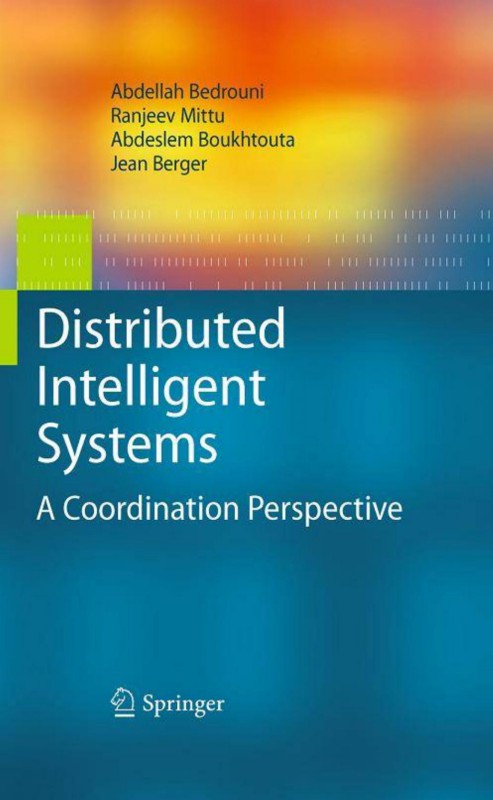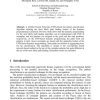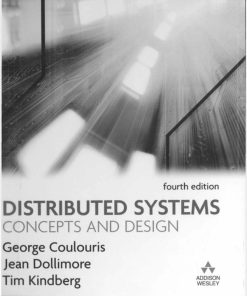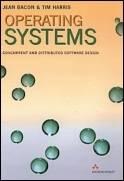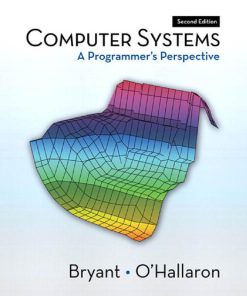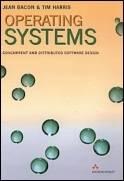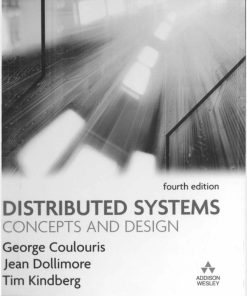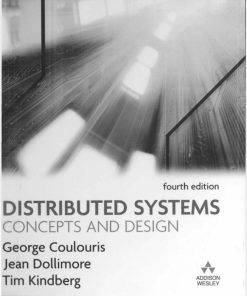Distributed Intelligent Systems A Coordination Perspective 2009th Edition by Abdellah Bedrouni Ranjeev Mittu Abdeslem Boukhtouta Jean Berger ISBN 0387777016 978-0387777016
$50.00 Original price was: $50.00.$25.00Current price is: $25.00.
Authors:Abdellah Bedrouni, Ranjeev Mittu, Abdeslem Boukhtouta, Jean Berger , Tags:Computer Science; Artificial Intelligence (incl. Robotics); Computer Communication Networks; Operating Systems; Computer Systems Organization and Communication Networks and Information Systems and Communication Service; Copyright © 2009 Springer. Uploaded By Dr Yasser S. El-Sayed; http://www.vet4arab.co.cc , Author sort:Abdellah Bedrouni, Ranjeev Mittu, Abdeslem Boukhtouta, Jean Berger , Languages:Languages:eng
Distributed Intelligent Systems A Coordination Perspective 2009th Edition by Abdellah Bedrouni Ranjeev Mittu Abdeslem Boukhtouta Jean Berger- Ebook PDF Instant Download/Delivery. 0387777016 978-0387777016
Full download Distributed Intelligent Systems A Coordination Perspective 2009th Edition after payment
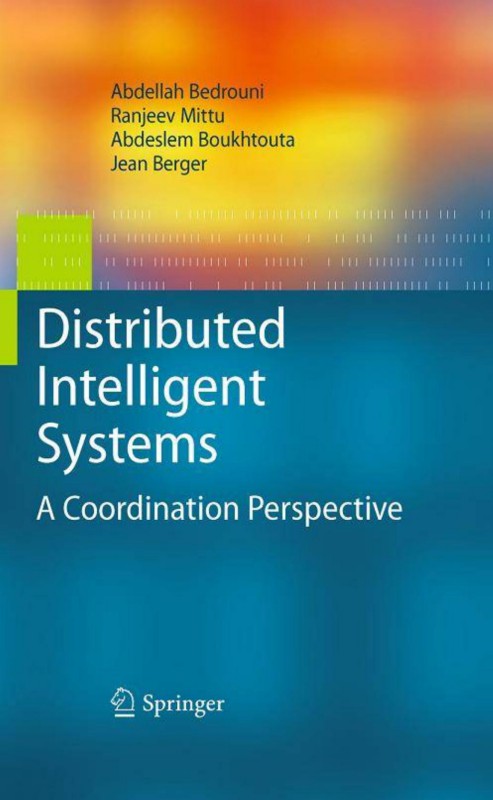
Product details:
ISBN 10: 0387777016
ISBN 13: 978-0387777016
Author: Abdellah Bedrouni Ranjeev Mittu Abdeslem Boukhtouta Jean Berge
Distributed Intelligent Systems: A Coordination Perspective comprehensively answers commonly asked questions about coordination in agent-oriented distributed systems. Characterizing the state-of-the-art research in the field of coordination with regard to the development of distributed agent-oriented systems is a particularly complex endeavour; while existing books deal with specific aspects of coordination, the major contribution of this book lies in the attempt to provide an in-depth review covering a wide range of issues regarding multi-agent coordination in Distributed Artificial Intelligence.
Key features:
Unveils the lack of coherence and order that characterizes the area of research pertaining to coordination of distributed intelligent systems
Examines coordination models, frameworks, strategies and techniques to enable the development of distributed intelligent agent-oriented systems
Provides specific recommendations to realize more widespread deployment of agent-based systems
Table of content:
Chapter 1 Coordination
1.1 Introduction
1.2 Coordination, a Challenging Issue
1.3 Coordination, an Ill-defined Concept
1.4 Coordination, Objective or Subjective?
1.4.1 Objective Coordination
1.4.2 Subjective Coordination
Chapter 2 Coordination in Distributed Problem Solving and Planning
2.1 Introduction
2.2 Properties of Distributed Problem Solving systems
2.2.1. The benevolent assumption
2.2.2. The common goals assumption
2.2.3. The centralized designer assumption
2.3 Distributed Problem Solving, applications and motivations
2.4 Task sharing
2.4.1 Task sharing among homogeneous agents
2.4.2 Task sharing in heterogeneous systems
2.4.3 Task sharing for distributed sensor net establishment
2.4.4 Task sharing for interdependent tasks
2.5 Result sharing
2.5.1 Functionally accurate cooperation
2.5.2 Shared repositories and negotiation search
2.5.3 Distributed constrained heuristic search
2.5.4 Organizational structuring
2.6 Distributed planning
2.6.1 Centralized planning for distributed plans
2.6.2 Distributed planning for centralized plans
2.6.3 Distributed planning for distributed plans
Chapter 3 Scalability and Performance Evaluation for the Coordination of
Distributed Systems
3.1 Coordination and scalability
3.1.1 Scalability and coordination strategies
3.1.2 Agent dimensions impacting the scalability
3.2 Coordination Performance Evaluation
3.2.1 Criteria for the evaluation of coordination
vii
viii Contents
Chapter 4 Coordination Models and Frameworks
4.1 Introduction
4.2 Sikora & Shaw Framework
4.3 Mintzberg Model
4.4 Tolksdorf Coordination Reference Model
4.5 Malone & Crowston theory of Coordination
4.6 Design Patterns for Coordination
Chapter 5 Coordination Strategies and Techniques
5.1 Introduction
5.2 Organizational structuring
5.3 Contracting
5.3.1 Different Types of Contracting
5.3.2 Contract Net Protocol
5.4 Multi-Agent Planning
5.5 Negotiation
5.5.1 Game Theory Based Negotiation
5.5.2 Plan-Based Negotiation
5.5.3 Human inspired AI-Based Negotiation
5.5.4 Strategic Negotiation
5.6 Auctions for Resolving Conflicts
5.6.1 Types of Auctions
5.6.2 Issues Related to the Types of Auctions
5.7 Market-oriented programming
5.8 Coalition Formation in Coordination
5.9 Argumentation in Coordination
5.9.1 Logic-based argumentation
5.9.2 Dialogues and Dialogue Systems
Chapter 6 Learning and Coordination
6.1 Introduction
6.2 Learning Coordination Behavior
6.2.1 Coordination Rules
6.2.2 Conventions
6.3 Team Learning
6.3.1 Composition of Behaviors
6.3.2 Role Conflicts
6.3.3 Hierarchical Approaches
6.4 Integrated Learning Techniques
6.4.1 Trust
6.4.2 Adjustable Autonomy
6.5 Applications of Machine Learning Techniques for Coordination
6.5.1 Adaptive Routing
6.5.2 Robotics
Contents ix
6.5.3 Intelligence, Surveillance, and Reconnaissance
Chapter 7 Applications of Multi-agent Coordination
7.1 Introduction
7.2 Defense
7.2.1 Simulation-C4I interoperability
7.2.2 Coalition Interoperability
7.3 Transportation
7.3.1 Air Traffic Flow Management
7.4 Healthcare
7.5 Communication Networks
7.5.1 Fault Diagnosis
7.5.2 Routing
7.6 E-Business
7.6.1 Supply Chain Management
7.7 Stability Operations and Disaster Relief
7.8 Tiered Systems
Chapter 8 Future Directions and Conclusion
8.1 Research Directions
8.1.1 Inter-corporate Agent-based Applications
8.1.2 Heterogeneity of Agents
8.1.3 Scalability of Emerging Agent-oriented Systems
8.1.4 Openness of Next Generation Systems
8.2 Technological Challenges
8.2.1 Appropriate Design Methodologies
8.2.2 Standards
8.2.3 Incorporate Learning and Reasoning Capabilities
8.2.4 Agent Organizations
8.2.5 Coalition Formation
8.2.6 Negotiation and Argumentation
8.3 Conclusion
People also search:
distributed intelligence examples
distributed intelligence psychology
distributed systems unit 4
distributed coordination-based systems
distributed ecosystem

